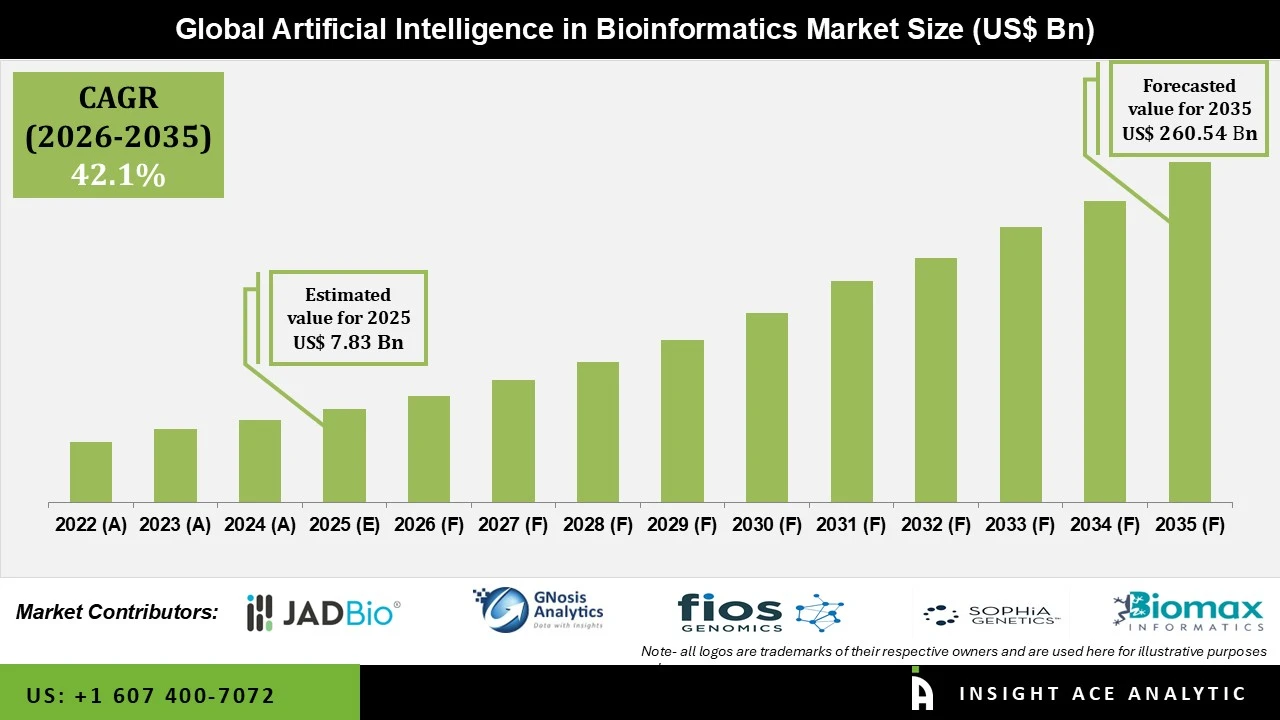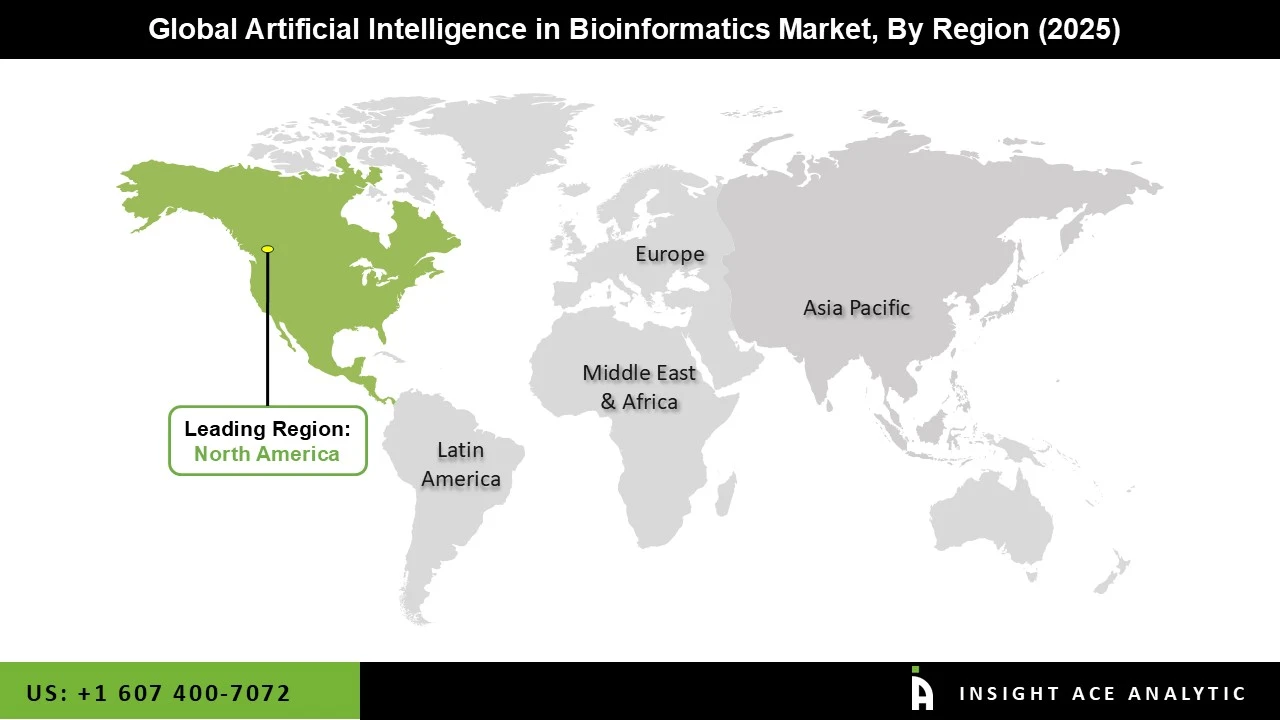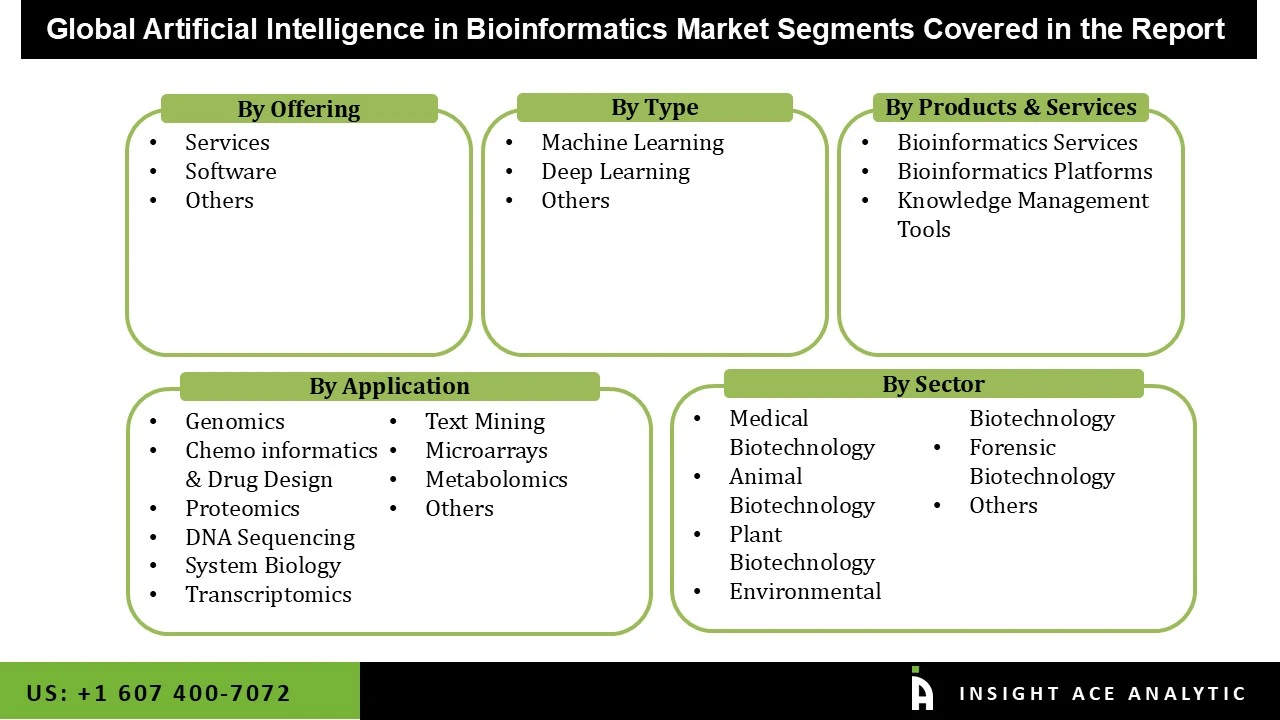Artificial Intelligence in Bioinformatics Market Size was valued at USD 7.83 Bn in 2025 and is predicted to reach USD 260.54 Bn by 2035 at a 42.1% CAGR during the forecast period for 2026 to 2035.
Artificial Intelligence in Bioinformatics Market Size, Share & Trends Analysis Report, By Offering (Software, Services, Others), By Type (Machine Learning, Deep Learning and Others), By Products and Services (Knowledge Management Tools, Bioinformatics Platforms, Bioinformatic Services), By Application, By Sector, By Region, Forecasts, 2026 to 2035

Artificial intelligence (AI) in bioinformatics uses AI tools and techniques for biomedical information analysis and interpretation. Substantial and complicated biological records, including protein frameworks, genome patterns, and other biology-related data, are managed and analyzed in bioinformatics. Government and business sector actions and medicine research and development should accelerate market expansion. Focus on research in drug research and development is made more accessible by bioinformatics, which searches through enormous datasets to find possible targets for therapy. It plays a crucial role in lead optimization, helping to identify the most effective medications by analyzing how they relate to targets in biology.
By refining clinical group choice and utilizing information analysis to enhance examination events, bioinformatics helps to improve clinical trial design. Bioinformatics reduces the possibility of late-stage failures by forecasting drug reactions, negativity, and efficiency. It makes data-based choices possible for pharmaceutical companies, favouring compounds with higher chances of achievement.
However, the AI-based bioinformatics industry is expected to be hindered by the elevated price of programs and offerings in this sector. The AI-based bioinformatics tool is quite complex, requiring high validation and additional growing specifications. Furthermore, genomics equipment is more expensive since they have more sophisticated capabilities and activities. Because research labs and drug companies need many of these systems, they have to invest a lot of resources in buying different genetic equipment. Compact and medium-sized medical companies and research labs cannot afford to invest so much money in several genomics' devices. Therefore, the high price of AI-based technology is anticipated to limit market expansion.
Artificial intelligence in bioinformatics is segmented based on offering, type, products and services, application, and sector. Based on the offering, the market is segmented into software, services, and others. The market is segmented based on type into machine learning, deep learning, and others. By product and services, the market is segmented into knowledge management tools, bioinformatics platforms, and bioinformatics services. The market is segmented by application into genomics, microarrays, system biology, text mining, chemoinformatics & drug design, proteomics, transcriptomics, DNA sequencing, metabolomics, and others. By sector, the market is segmented into medical biotechnology, animal biotechnology, plant biotechnology, environmental biotechnology, forensic biotechnology, and others.
The software segment is expected to hold a significant global market share in 2023 because more businesses are opening up and providing instruments and machines. Bioinformatics software is used more frequently in research investigations due to the benefits of genomics and statistical systems. This encourages investors to devote more to research and development, fueling the segment's expansion.
The proteomics industry uses the bulk of acrylic acid esters because of increased investments in technology development and the growth of R&D projects. These technologies support large-scale data management and analysis. Additionally, algorithms are employed in databases to manage and oversee material. The proteomics segment is growing due to these various factors, especially in countries like the US, Germany, the U.K., China, and India.
The North American artificial intelligence in the bioinformatics market is expected to register the highest market share in revenue in the near future. It can be attributed to this sector has grown more quickly as a result of the growing demand for cutting-edge technologies and medication discovery & creation. In response to the growing demand, businesses and industry participants are implementing a range of tactics, including product introductions, partnerships for acquisitions, and advancements, among others, which are anticipated to accelerate market expansion. In addition, Asia Pacific is projected to grow rapidly in the global artificial intelligence in bioinformatics market due to advancements in the industries of proteins and genetics, which provide vast volumes of data that need to be processed and interpreted. More sophisticated algorithms for bioinformatics are also required, as these are critical to investigating and creating treatments.

| Report Attribute | Specifications |
| Market Size Value In 2025 | USD 7.83 Bn |
| Revenue Forecast In 2035 | USD 260.54 Bn |
| Growth Rate CAGR | CAGR of 42.1% from 2026 to 2035 |
| Quantitative Units | Representation of revenue in US$ Mn and CAGR from 2026 to 2035 |
| Historic Year | 2022 to 2024 |
| Forecast Year | 2026 to 2035 |
| Report Coverage | The forecast of revenue, the position of the company, the competitive market structure, growth prospects, and trends |
| Segments Covered | By Type, By Application, By Offering, By Product and Services, By Sector and By Region |
| Regional Scope | North America; Europe; Asia Pacific; Latin America; Middle East & Africa |
| Country Scope | U.S.; Canada; U.K.; Germany; China; India; Japan; Brazil; Mexico; France; Italy; Spain; South East Asia; South Korea |
| Competitive Landscape | JADBio, Gnosis Data Analysis, Fios Genomics, SOPHiA GENETICS, Biomax Informatics Inc., DNASTAR, Ardigen (Parent Company Selvita Group), Source BioScience, QIAGEN, NeoGenomics Laboratories, CelbridgeScience, Eurofins Scientific, Illumina, Inc., Thermo Fisher Scientific, Inc., Insilico Medicine, Strand Life Sciences, Dassault Systèmes, iNDX.Ai, Paige AI, Inc., and SomaLogic Operating Co., Inc. |
| Customization Scope | Free customization report with the procurement of the report and modifications to the regional and segment scope. Particular Geographic competitive landscape. |
| Pricing And Available Payment Methods | Explore pricing alternatives that are customized to your particular study requirements. |
Artificial Intelligence in Bioinformatics Market- By Offering

Artificial Intelligence in Bioinformatics Market- By Type
Artificial Intelligence in Bioinformatics Market- By Products and Services
Artificial Intelligence in Bioinformatics Market- By Application
Artificial Intelligence in Bioinformatics Market- By Sector
Artificial Intelligence in Bioinformatics Market- By Region
North America-
Europe-
Asia-Pacific-
Latin America-
Middle East & Africa-
This study employed a multi-step, mixed-method research approach that integrates:
This approach ensures a balanced and validated understanding of both macro- and micro-level market factors influencing the market.
Secondary research for this study involved the collection, review, and analysis of publicly available and paid data sources to build the initial fact base, understand historical market behaviour, identify data gaps, and refine the hypotheses for primary research.
Secondary data for the market study was gathered from multiple credible sources, including:
These sources were used to compile historical data, market volumes/prices, industry trends, technological developments, and competitive insights.

Primary research was conducted to validate secondary data, understand real-time market dynamics, capture price points and adoption trends, and verify the assumptions used in the market modelling.
Primary interviews for this study involved:
Interviews were conducted via:
Primary insights were incorporated into demand modelling, pricing analysis, technology evaluation, and market share estimation.
All collected data were processed and normalized to ensure consistency and comparability across regions and time frames.
The data validation process included:
This ensured that the dataset used for modelling was clean, robust, and reliable.
The bottom-up approach involved aggregating segment-level data, such as:
This method was primarily used when detailed micro-level market data were available.

The top-down approach used macro-level indicators:
This approach was used for segments where granular data were limited or inconsistent.
To ensure accuracy, a triangulated hybrid model was used. This included:
This multi-angle validation yielded the final market size.
Market forecasts were developed using a combination of time-series modelling, adoption curve analysis, and driver-based forecasting tools.
Given inherent uncertainties, three scenarios were constructed:
Sensitivity testing was conducted on key variables, including pricing, demand elasticity, and regional adoption.